Why Alternative Addiction Therapies Are Revolutionizing Recovery
Alternative addiction therapies are changing how people break free from substance use disorders, offering hope beyond traditional treatment methods. Nearly 296 million people worldwide used drugs in 2020—a 28% increase from 2009—yet only one in eight people globally receives treatment for substance use disorders.
Most Common Alternative Addiction Therapies: - Acupuncture & Auriculotherapy - Success rates up to 50% for reducing cravings - Mindfulness-Based Relapse Prevention - Combines meditation with recovery support - Nutritional Therapy - Repairs micronutrient deficiencies from substance use - Art & Music Therapy - Uses creative expression for emotional healing - Yoga & Tai Chi - Reduces stress hormones and improves mental clarity - Animal-Assisted Therapy - Builds responsibility and emotional connection - Hypnotherapy - Rewires subconscious patterns driving addiction - Biofeedback - Teaches self-regulation of stress responses
Research shows these therapies work best alongside traditional treatment, not as replacements. They address the whole person—mind, body, and spirit—rather than just the addiction symptoms.
The surge in alternative therapy research since 2015 reflects growing recognition that cookie-cutter treatment approaches often fail by not addressing individual needs. High-achieving professionals especially benefit from these personalized, holistic approaches that restore energy, reduce anxiety, and support long-term recovery.
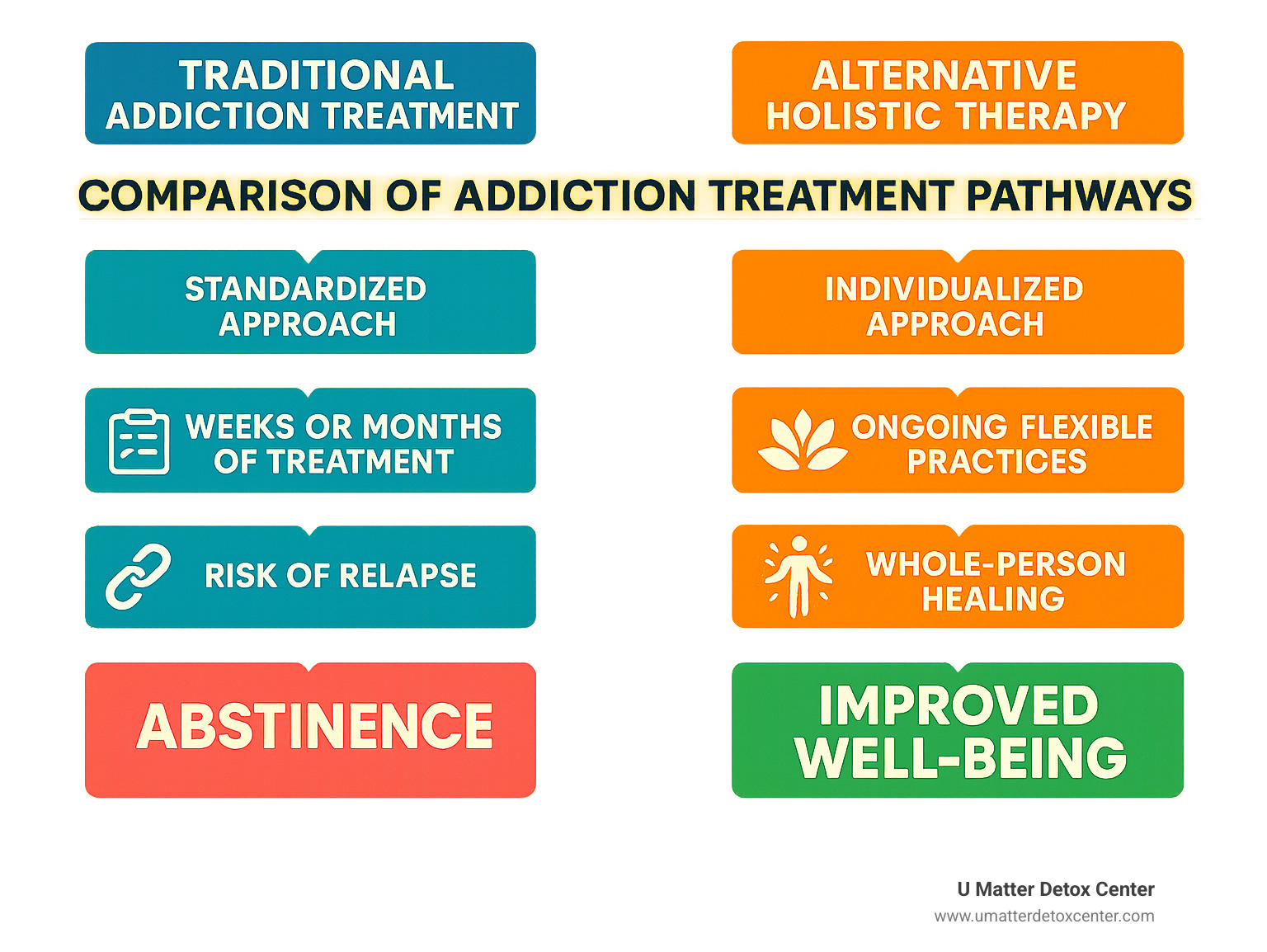
What Makes Alternative & Holistic Care Different?
Complementary and alternative medicine (CAM) makes an important distinction. Complementary treatments work alongside traditional medicine, while alternative treatments are used instead of conventional approaches. Think of it like this: taking acupuncture while also doing regular therapy is complementary. Skipping medical detox entirely and only using herbs would be alternative.
The World Health Organization recognizes Traditional, Complementary and Integrative Medicine as essential healthcare approaches. What makes them special? They treat you as a whole person, not just a collection of symptoms to fix.
Your body isn't broken—it just needs the right support. Traditional addiction treatment often focuses on what's wrong with you. Alternative approaches focus on what's right with you and how to strengthen those natural healing abilities.
Everything is connected. Maybe your addiction started after a traumatic experience. Or perhaps years of substance use depleted your body of essential nutrients, leaving you anxious and depressed. Complementary medicine recognizes these connections and addresses root causes, not just surface problems.
Evidence-based doesn't mean cold and clinical. Modern alternative therapies aren't based on wishful thinking. They're backed by solid research showing real results. The difference is they use this science to create warm, personalized treatment experiences.
The stigma around addiction treatment is finally shifting too. Many people find alternative therapies less intimidating than traditional rehab settings. There's something naturally healing about practicing yoga in a peaceful room or expressing your feelings through art therapy.
Integrative care gives you the best of both worlds. You get the medical safety net of conventional treatment plus the deep, personalized healing of alternative approaches.
The Rise of Alternative Addiction Therapies Worldwide
Something remarkable has been happening in addiction research over the past decade. Scientists worldwide are finally taking alternative addiction therapies seriously, and the numbers tell an incredible story.
A major study tracked research publications on complementary and alternative medicine for substance use disorders from 2001 to 2020. What they found was eye-opening: 3,807 research papers were published during this period, with a dramatic explosion starting in 2015. By 2020, researchers were publishing over 300 papers annually on these approaches.
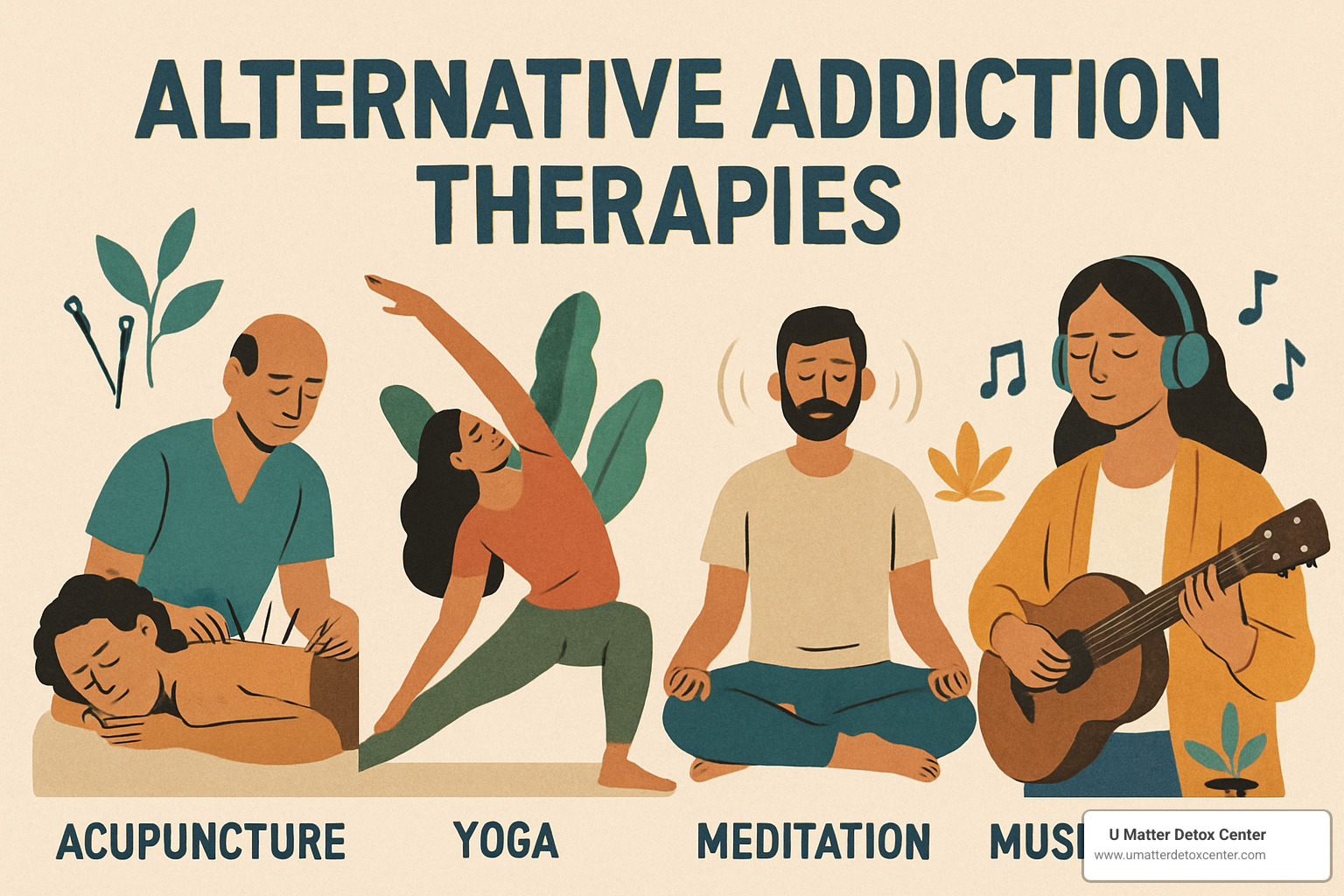
The research isn't coming from just one corner of the world either. The United States leads the charge, producing nearly nine times more influential research than any other country. China has emerged as a powerhouse, especially in acupuncture studies that blend their ancient healing traditions with modern scientific methods. England rounds out the top three, contributing groundbreaking research on mind-body approaches.
What's driving this surge? The harsh reality is that traditional addiction treatment alone isn't enough. The US spends a staggering $740 billion annually on medical care for substance use disorders, yet over 35.6 million people worldwide still struggle with these conditions.
How Alternative Addiction Therapies like Acupuncture Reset Cravings
Of all the alternative addiction therapies being studied, acupuncture has the most impressive research backing. The National Acupuncture Detoxification Association (NADA) developed a standardized approach that's now used in treatment centers worldwide.
Traditional Chinese Medicine views addiction as an "empty fire" energy imbalance in the body. By placing thin needles at specific points, practitioners restore the flow of qi (life energy) through your body's meridians. From a Western science perspective, acupuncture triggers your body's natural endorphin production.
The NADA protocol is beautifully simple. You sit quietly for 30-45 minutes with needles placed at five specific points in your ears. Most people describe feeling "calm but energized" afterward.
The results speak for themselves. Studies show success rates as high as 50% for various addictions. Acupuncture works particularly well for opioid and alcohol withdrawal, reducing symptoms like headaches, nausea, depression, and intense cravings.
Why Mind-Body Alternative Addiction Therapies Boost Relapse Prevention
Mind-body practices might be the secret weapon in alternative addiction therapies. These approaches teach you something crucial: how to observe your cravings without automatically acting on them.
Mindfulness-Based Relapse Prevention (MBRP) is an 8-week program that teaches the SOBER technique. When cravings hit, you Stop, Observe what's happening, Breathe deeply, Expand your awareness, and Respond mindfully instead of reacting automatically.
Tai Chi offers something special too. This gentle "moving meditation" actually reduces cortisol levels in your body. Since cortisol is the stress hormone that often triggers cravings, Tai Chi gives you a natural way to stay balanced.
HeartMath biofeedback brings ancient mindfulness into the digital age. Using simple devices that monitor your heart rate patterns, you learn to regulate your stress responses in real-time.
11 Surprising Therapies to Try Today
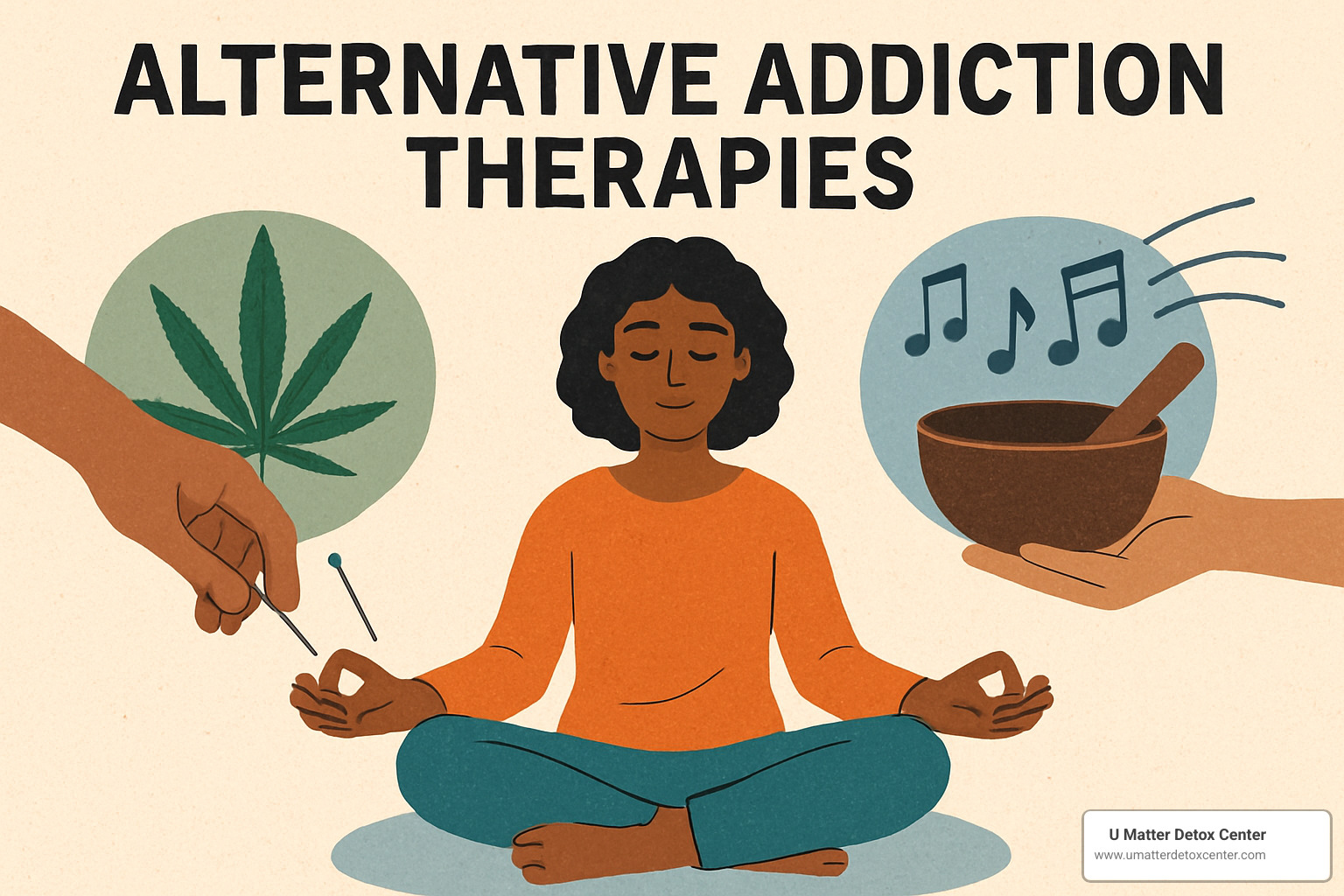
Recovery doesn't have to follow a one-size-fits-all approach. These eleven alternative addiction therapies are helping people break free from substance use in ways that honor their individual needs and healing styles.
Acupuncture & Auriculotherapy
Think of acupuncture as your body's natural reset button. Auriculotherapy takes this further with tiny pellets taped to specific spots on your ear. When cravings hit, you can gently press these points yourself—giving you immediate access to relief.
The sessions themselves are surprisingly peaceful. You'll sit quietly for 15 to 40 minutes while ultra-thin needles work their magic. Most people describe feeling both calm and energized afterward.
Acupuncture triggers your body's natural endorphin production—essentially creating a healthy high that replaces the artificial one from substances. The effects can last up to five days per session, making it especially helpful for opioid withdrawal, alcohol cravings, and nicotine addiction.
Nutrition & Natural Products
Substance use literally steals nutrients from your body. Your brain can't make the chemicals it needs to feel good naturally when it's missing key building blocks.
Medical Nutrition Therapy breaks this cycle by systematically addressing what your body is missing. Essential nutrients like zinc, vitamin C, and B-vitamins support the production of feel-good neurotransmitters. Magnesium and calcium calm your nervous system naturally.
Nature also offers some gentle helpers. Passionflower can ease the emotional aspects of withdrawal when combined with proper medical care. Chamomile provides natural anxiety relief without side effects.
We've seen clients report dramatic improvements in energy, mood, and cravings within just weeks of starting targeted nutritional support.
Hypnotherapy & Guided Imagery
Hypnotherapy isn't about losing control. It's actually about gaining control over the automatic responses that drive substance use. Your subconscious mind is where addictive patterns live, and hypnotherapy gives you access to rewire them.
During a session, a trained therapist guides you into a deeply relaxed state where your mind becomes more open to positive suggestions. Post-hypnotic suggestions can help you automatically choose healthy responses when you're triggered.
Hypnotherapy works particularly well for nicotine addiction and helps address buried thoughts and emotions that fuel addictive behaviors.
Creative & Experiential Approaches
Sometimes words just aren't enough to process what you're feeling. That's where creative therapies shine—they offer entirely different languages for healing.
Art therapy uses drawing, painting, sculpture, and other visual arts to explore emotions that are hard to put into words. Music therapy goes beyond just listening to songs. Credentialed music therapists use patient-centered approaches to address specific recovery goals.
Dance and movement therapy addresses something crucial: addiction often involves complete disconnection from your body. Movement therapy helps you reconnect with physical sensations and emotions.
Art therapy provides a safe way to express complex emotions without having to find the "right" words.
Animal-Assisted & Equine Therapy
There's something almost magical about the healing bond between humans and animals. Canine therapy offers something precious: unconditional acceptance. Dogs don't judge your past—they simply respond to who you are in this moment.
Equine therapy takes this even deeper. Horses are incredibly sensitive to human emotions and provide immediate, honest feedback about your internal state. Caring for these magnificent animals teaches responsibility, routine, and emotional regulation.
Animal interaction triggers oxytocin release—that's the "bonding hormone"—while simultaneously reducing stress hormones. Participants in equine therapy programs often stay in treatment twice as long as those in traditional programs alone.
Animal-assisted therapy and equine therapy work especially well for people who struggle with trust issues.
Psychedelic-Assisted Options (Ibogaine)
Ibogaine represents one of the most controversial yet potentially powerful alternative addiction therapies available today. This naturally occurring compound from African plants can potentially interrupt opioid dependence in a single session.
The experience involves two distinct phases: first visionary, then deeply introspective. Animal studies show reduced cocaine and morphine use after ibogaine treatment, and human studies report interruption of withdrawal symptoms for up to 72 hours.
But here's the critical part: ibogaine carries serious risks. Fatal cardiac events occur in approximately 1 in 300 treatments. It's also illegal in the United States.
Currently, researchers are working on safer derivatives like 18-MC that might retain the anti-addictive properties without the life-threatening cardiac risks. This therapy represents the cutting edge of addiction treatment—full of promise but requiring extreme caution and professional oversight.
Integrating Holistic & Conventional Care for Dual Diagnosis Detox
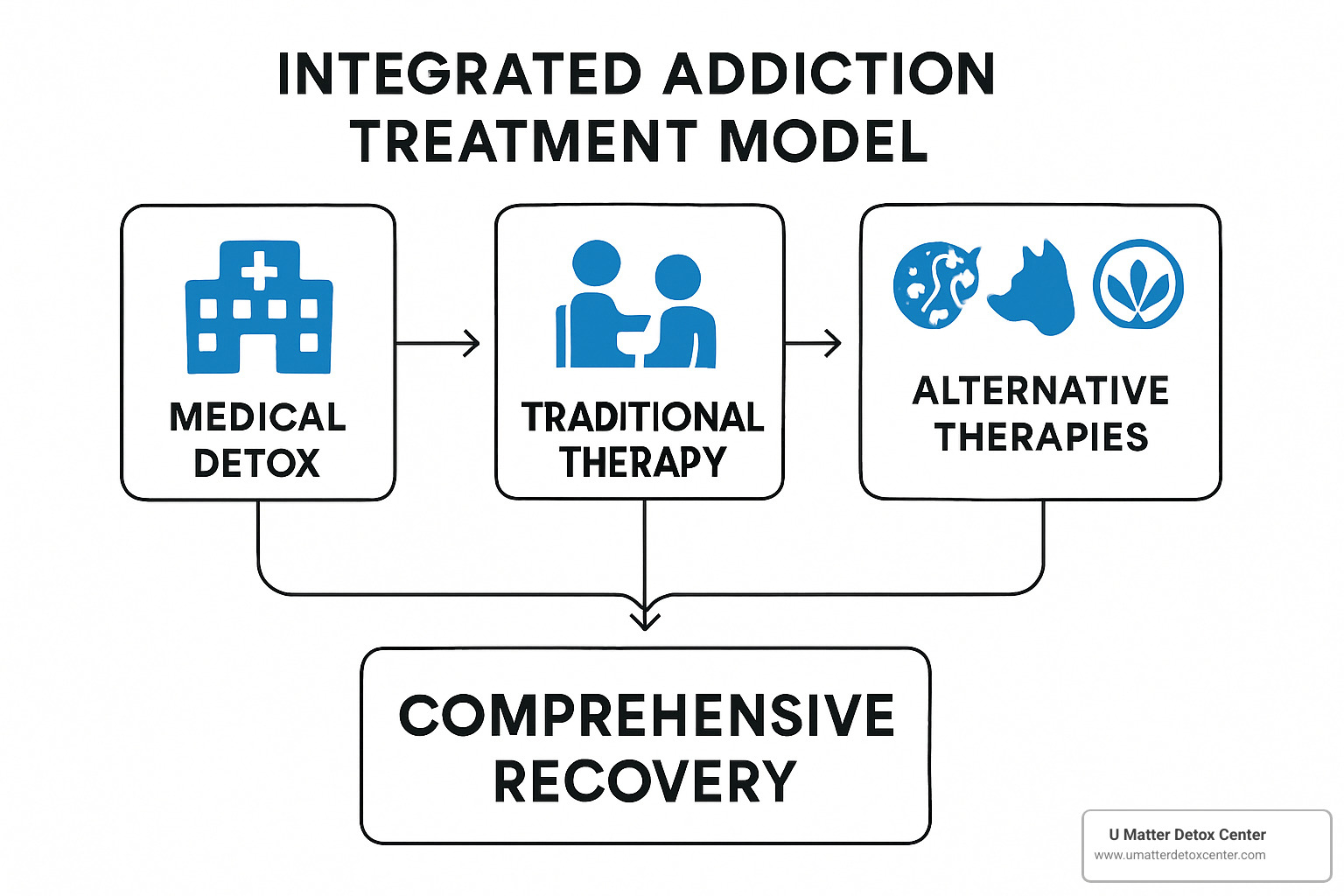
The real breakthrough in addiction treatment happens when we stop seeing conventional and alternative addiction therapies as competing approaches. Instead, they work together like instruments in an orchestra—each playing their part to create something beautiful.
At U Matter Detox Center, we've learned that the most successful recoveries happen when people get the best of both worlds. Our luxury programs across California combine medical expertise with holistic healing in ways that feel natural, not forced.
Starting with Safety: Every journey begins with medically supervised detox. We use Medication-Assisted Treatment (MAT) when appropriate—medications like buprenorphine or naltrexone that are proven to reduce cravings and prevent relapse. This medical foundation keeps you safe while your body heals.
Once you're medically stable, we begin weaving in complementary therapies that address the whole person. Morning yoga sessions help reset your nervous system for the day. Acupuncture treatments work alongside your medications to further reduce cravings. Nutritional therapy repairs the damage that substances have done to your body at a cellular level.
The Therapy Sweet Spot: When we combine Cognitive Behavioral Therapy (CBT) with mindfulness practices, something magical happens. CBT teaches you to recognize the thought patterns that lead to substance use. Mindfulness teaches you to observe those thoughts without being controlled by them.
Many of our clients also participate in 12-Step programs while receiving complementary support. Imagine attending AA meetings with the added benefit of reduced anxiety from regular acupuncture, or working through the steps with the emotional clarity that comes from proper nutrition.
Dual Diagnosis Expertise: When you're dealing with both addiction and mental health challenges—what we call dual diagnosis—this integrated approach becomes even more crucial. Depression, anxiety, and trauma often fuel substance use. Alternative addiction therapies like art therapy, biofeedback, and animal-assisted therapy address these underlying issues in ways that traditional talk therapy alone might miss.
Making It Affordable: Most major insurance plans now recognize the value of integrative approaches. When alternative therapies are part of a comprehensive medical treatment program, coverage is often available. We work closely with insurance providers to maximize your benefits.
Your Unique Blueprint: Our multidisciplinary team creates individualized treatment plans that might include different blends of conventional and alternative therapies. Some clients thrive with acupuncture and yoga. Others respond better to art therapy and biofeedback. We adjust your plan based on what's actually working for you.
| Conventional Pillars | Holistic Pillars |
|---|---|
| Medical detox | Nutritional repair |
| Medication management | Acupuncture & TCM |
| Individual therapy | Mindfulness & meditation |
| Group counseling | Creative arts therapy |
| 12-Step facilitation | Yoga & movement |
| Psychiatric care | Biofeedback training |
Weighing Evidence, Benefits & Risks
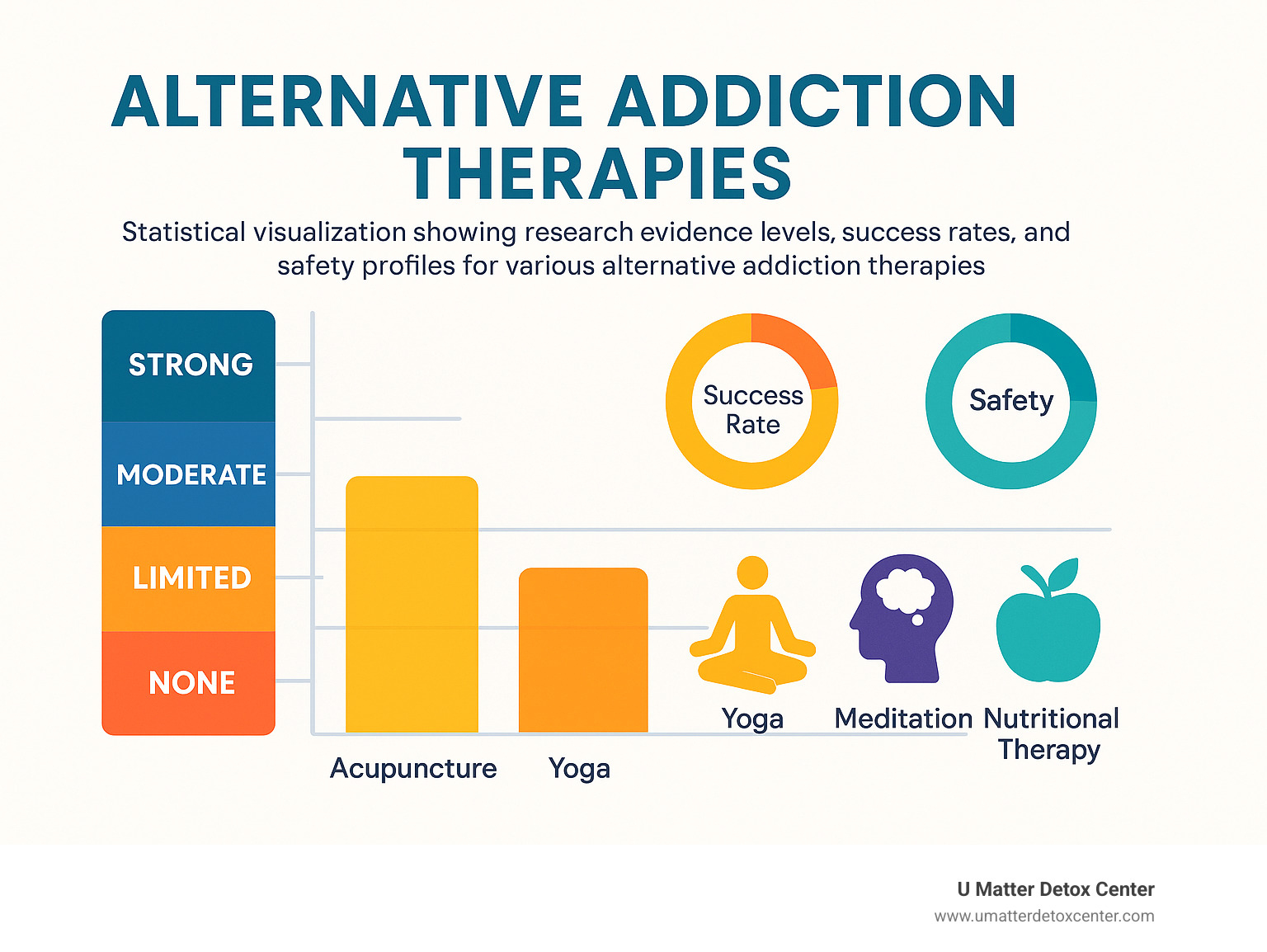
When it comes to alternative addiction therapies, we need to be completely honest about what works—and what doesn't. After reviewing thousands of research papers and working with clients for years, here's what the science actually tells us.
Acupuncture stands out as having the strongest research backing. Multiple large-scale studies show real improvements in withdrawal symptoms and craving reduction. Some trials show success rates hitting 50% or higher. The evidence is solid enough that major medical centers now offer acupuncture as part of their addiction programs.
Mindfulness-based approaches like MBRP have extensive research support too. When people learn to observe their cravings without automatically acting on them, relapse rates drop significantly. The beautiful thing about mindfulness is that it gives people tools they can use anywhere, anytime a craving hits.
Yoga and Tai Chi consistently show improvements in stress reduction and treatment retention. One meta-analysis found that people who added yoga to their recovery program stayed in treatment twice as long.
Now let's talk about the therapies that show promise but need more research. Art and music therapy get rave reviews from clients, and we see real breakthroughs happen during creative sessions. But the controlled studies are still catching up to what we observe clinically.
Nutritional therapy sits in an interesting spot. The science behind micronutrient deficiencies in addiction is rock-solid. We know alcohol depletes B vitamins, and we know those deficiencies worsen cravings. But research on specific supplement protocols is still emerging.
Here's where things get serious: some alternative addiction therapies carry real risks. Ibogaine is the big one—while it can interrupt opioid dependence dramatically, about 1 in 300 people die from cardiac complications. That's why it's illegal in the US and requires intensive medical monitoring where it's available.
Herbal supplements present their own challenges. St. John's Wort can interfere with prescription medications. Kava has been linked to liver problems. The lack of FDA regulation means quality varies wildly between products.
One of our biggest concerns is the quality control issue across the field. Practitioner credentials vary dramatically. Some people call themselves "addiction specialists" after weekend workshops, while others have decades of training.
We've also seen providers make wild claims about "miracle cures" or "100% success rates." That's not just misleading—it's dangerous. People might delay getting proven medical treatment while chasing unrealistic promises.
The National Center for Complementary and Integrative Health puts it perfectly: these therapies work best as complements to, not replacements for, proven medical treatments. That's exactly how we approach things at U Matter Detox Center.
We only use evidence-based alternative addiction therapies delivered by properly credentialed practitioners. Every intervention gets integrated with medical oversight to ensure both safety and effectiveness.
The bottom line? Many alternative therapies offer genuine benefits when used appropriately. They're not magic bullets, but they can be powerful tools in a comprehensive recovery program.
Frequently Asked Questions about Alternative Addiction Therapies
When people first hear about alternative addiction therapies, they usually have the same three concerns. Let's address them honestly.
Do these therapies replace medical detox?
Alternative addiction therapies should never replace medical detox, especially if you're dealing with alcohol, benzodiazepines, or opioids. Withdrawal from these substances can actually kill you without proper medical supervision.
Think of medical detox as your safety net—it keeps you alive and stable during those scary first days. Alternative therapies are like the scaffolding that helps you build a stronger, more resilient recovery on top of that foundation.
The magic happens when you combine both approaches. Medical detox handles the dangerous physical stuff, while acupuncture, meditation, and nutritional therapy help you feel human again faster.
How quickly can I feel benefits?
This depends on which therapy you're talking about and how your body responds.
Some things work almost immediately. Acupuncture often brings relief within the first session—people tell us they feel "lighter" or "less wound up" before they even leave the treatment room. Same with therapy animals.
Yoga and meditation usually start helping within the first week if you practice regularly. Most people notice they're sleeping better and feeling less anxious pretty quickly.
Nutritional therapy takes a bit longer—usually 1-2 weeks before you notice your energy coming back and your brain fog lifting. Your body needs time to rebuild what substances took away.
The deeper changes take patience. Mindfulness-based relapse prevention typically requires about 8 weeks of consistent practice before you really master the skills. But those skills last a lifetime once you develop them.
How do I vet a reputable holistic center?
Red flags that should make you run the other way include any center that promises "miracle cures" or claims they can cure addiction in 30 days with just herbs and crystals. If they discourage you from taking prescribed medications or refuse to work with your doctor, that's a huge problem.
Also be wary of practitioners who won't show you their credentials. Real acupuncturists have NCCAOM certification. Legitimate biofeedback providers are certified by BCIA.
Good centers are transparent about everything. They'll gladly explain their success rates (and their limitations). They work with your insurance company and coordinate with your other healthcare providers. Most importantly, they have licensed medical staff overseeing detox—not just wellness coaches.
At U Matter Detox Center, we maintain rigorous standards across all our California locations. Our alternative therapy practitioners hold proper certifications, and everything happens under medical supervision.
The best way to evaluate any center is to ask lots of questions during your consultation. How do they integrate conventional and alternative approaches? What happens if you have a medical emergency?
Trust your gut. If something feels off, it probably is. Your recovery is too important to gamble with unqualified providers.
Conclusion
The landscape of addiction recovery is changing, and alternative addiction therapies are leading the way. What we've found through research and real-world experience is that healing happens fastest when we treat the whole person—not just the addiction symptoms.
These therapies aren't magic cures, but they offer something traditional treatment often misses: a path to recovery that feels authentic and personalized. When someone struggling with addiction finds relief through acupuncture or finds emotional breakthroughs in art therapy, they're not just managing symptoms—they're reconnecting with parts of themselves that addiction had stolen away.
The evidence speaks for itself. From acupuncture's documented success in reducing cravings to mindfulness practices that cut relapse rates, these approaches work. But here's what makes them truly powerful: they work best alongside medical treatment, creating a comprehensive healing experience that addresses every aspect of recovery.
At U Matter Detox Center, we've seen this integration transform lives across our California locations. Our luxury holistic programs don't just combine advanced non-invasive technologies with natural remedies—we create individualized treatment plans that honor each person's unique path to healing.
Recovery isn't a one-size-fits-all journey. Some people need the grounding presence of equine therapy. Others find their breakthrough in the quiet moments of meditation. Many find that nutritional therapy gives them the energy and clarity they need to fully engage in their healing process.
The beautiful thing about alternative addiction therapies is that they restore hope for people who thought they'd tried everything. They offer new doorways into recovery for those who felt stuck in traditional approaches. And they provide tools for long-term wellness that extend far beyond just staying sober.
Your recovery story doesn't have to look like anyone else's. With Holistic therapy options that range from time-tested practices to innovative new approaches, you can craft a healing journey that truly fits who you are and who you want to become.
The first step might feel overwhelming, but you don't have to take it alone. If you're ready to explore how these transformative therapies can support your recovery, we're here to walk alongside you toward lasting freedom and wellness.

